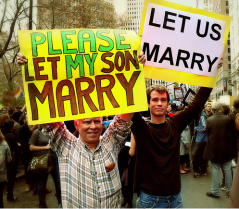![]() Meet Jessica, a real live lawyer! She’s about to blow your mind with facts and explanations like it’s her job because, incidentally, it is! Jessica works for a legal publishing company where she writes and edits articles that explain legal developments to people who didn’t go to law school. You might remember her from the Prop 8 Trial, when she basically schooled us and we liked it. Aren’t you glad she gave up on her initial dream of becoming the world’s first dancing astronaut?
Meet Jessica, a real live lawyer! She’s about to blow your mind with facts and explanations like it’s her job because, incidentally, it is! Jessica works for a legal publishing company where she writes and edits articles that explain legal developments to people who didn’t go to law school. You might remember her from the Prop 8 Trial, when she basically schooled us and we liked it. Aren’t you glad she gave up on her initial dream of becoming the world’s first dancing astronaut?
See Jessica’s other stories for Autostraddle:
Prop 8 Gay Marriage Trial, Explained: Lez Legal Eagle Answers Your Lawfully Ignorant Questions
Prop 8 Gay Marriage Trial Explained Pt. 2: Equal Protection & Why They Do Those Things They Do
+
Not everyone can live in the socially progressive haven of Iowa. The vast majority of Americans are stuck in states where marriage equality is only coming in the next few years if the Supreme Court issues a nationwide mandate. (And most of the world is taking its time, too).
If you think about it for very long at all, this is likely to become really depressing and overwhelming. For as much progress as the LGBT movement has made in the past several decades, we’re still years away from equal protections under the law — more than half of the states in this country have intentionally written discrimination into their state constitutions. (Isn’t it great to feel so well-liked?)

But in the light of this frustration, it’s especially important to remember that no matter where your government may be on the road to equality, there are steps you can take to advance the cause. And with that in mind, consider the work of Project 515, a Minnesota organization working to ensure that same-sex couples and their families have equal protections under the state laws.
The Context: Minnesota Marriage Equality Is Going Nowhere Fast
Here in Minnesota, we are among the states moving too slowly toward marriage equality. We have a governor who is possessed of presidential delusions for 2012. He’s busy ratcheting up his conservative credentials and has all but promised to veto anything that smells like Democrat – so there’s no point in even trying to secure legislative support to overturn Minnesota’s Defense of Marriage Act until he’s out of office.

And unlike our sensible neighbors to the south, equality isn’t coming through our courts. Back in 1971, the Minnesota Supreme Court held that state law limited marriage to opposite-sex couples. Should someone attempt to pursue litigation through the courts, there’s a very real possibility that we’d just end up with a reaffirmation of the prior holding – which would ultimately impede our efforts. Accordingly, our local advocacy organizations have taken a strong stance against litigation as a means of reaching equality. (Note: Not everyone agrees with this stance).
Moving Forward When The State Is Stuck
Given the current situation, we only have a few options. We can postpone the ultimate goal of equality while we work to improve the political climate. We can build relationships with current senators and representatives to ensure that they vote with us once we have a better governor, and we can work to elect people who support marriage equality. And certainly, we are doing this. But this is a slow process; some bigoted governors stick around for a long time.
Alternatively, we can get creative. Clearly marriage is more than a label; it comes with legal rights and privileges. If we can’t have marriage right now, can we have some of these rights and privileges?
The Rights and Privileges of Marriage

Before you can demand rights, you must understand the rights. In Minnesota, at least 515 state statutes provide rights and assign responsibilities to couples based on marriage.
Some of these seem sort of trivial. I could be with my girlfriend for the next 60 years, and I will never be concerned about my inability to legally slaughter poultry for her without getting a foodhandlers’ license. Obviously we’re both vegetarians.
But most of them matter.
These laws affect health care, professional obligations, inheritance rights and a wide range of other benefits. They protect families by providing default rules for difficult situations. And yet, as long as same-sex couples are unable to marry, these protections do not extend to their families.
Project 515: Equal Rights For Same-Sex Couples and Their Families
Equipped with this information, Project 515 is working to change the particular laws that create inequalities for committed same-sex couples in Minnesota. Clearly, it’s impossible to tackle 515 laws at once. Instead, the organization has selected specific priorities for the 2010 legislative session.
They’re working to ensure that domestic partners (two people who are of the same sex who have “assumed responsibilities for each other’s basic common welfare, financial obligation and well-being” and live together and aren’t married to other people and aren’t related) can have some of the most important rights that married people have.
“In the eyes of the law, Great Uncle Jeremiah who you’ve never met takes priority over your partner of 40 years.”
For example, if you’re married, your spouse gets to choose what happens to your remains after you die. If you’re not – that decision goes to your next of kin. In the eyes of the law, Great Uncle Jeremiah who you’ve never met takes priority over your partner of 40 years. Under the combined Final Wishes and Wrongful Death bill, which is currently en route to the governor’s desk, your partner would come first.
Generally married couples can’t be required to testify against each other in a courtroom (under the assumption that the threat of having your spouse testify against you is unlikely to improve your communication skills). The Equal Access to Justice bill would, among other things, extend similar protections to domestic partners.
A few weeks ago, President Obama directed Kathleen Sebelius to issue new rules granting hospital visitation rights for LGBT families. Rulemaking takes time, so it is not yet clear what these rules will entail – but it is likely that the Equal Access to Health Records Bill would extend these protections even further for people in Minnesota.

These are just a few of the provisions that Project 515 is working to address this legislative session. Unfortunately, even if the organization is completely successful and can pass all of its intended legislation this year, we’ll still be a long way from legal equality. But the little victories matter in very real, practical ways. These laws affect the daily lives of gay and lesbian couples in Minnesota, and the lack of legal protections often become most apparent during already terrible times.
We can’t all live in Iowa…but we also can’t all live in Minnesota. (Sad for the rest of you, cause Minnesota’s awesome). Although the work of Project 515 is clearly focused on Minnesota, though, it still matters for people outside of the state. The organization has established another path for protecting same-sex couples and their families — and this approach can be used no matter where your state might fall with regard to LGBT rights.
Marriage is important. There is no question that gradually changing the individual laws is no substitute for simply having access to all of the rights and privileges of marriage. But until that day arrives, targeting particular laws can help to protect relationships that the government won’t recognize.








Comments
I appreciate this article, because I do think Project 515 is engaging in a strategy that others are not. But, the reality is that Gov. Pawlenty won’t sign Project 515’s legislation. Against Pawlenty, Project 515 is not going to be successful.
The two paths in the very short term: elect anyone other than Tom Emmer or file suit. And, I hate to be a pessimist, but Emmer has a good shot given the conservative election cycle. Litigation may be the only shot in the short term if that happens.
I’m young, so I can wait long term. But others aren’t, and I respect their sense of urgency despite the long odds on winning in court.
1) Pawlenty wasn’t always THIS awful. Last year, he signed the Protecting One’s Home bill, Project 515’s first legislative initiative. I agree that he’s made it clear that he’s no longer cooperating with anyone on anything…but I still think they have an effective approach that’s worth replicating.
2) I really can’t even contemplate the possibility of living in a state with Tom Emmer as governor.
3) The problem with taking the long odds is that the court system operates on the principle of Stare Decisis, which means that judges are generally obligated to follow the decisions of the judges who have come before. If the courts rule against us again (as is quite likely), we’re setting the movement towards marriage back. If instead, we wait a few more years until the political climate/general societal climate improves, there’s a much better chance that we can win through litigation (based on the rationale that someday, nobody will want to be the state with the last of these laws on their books).
Everyone gets to make their own decisions, and I understand the desire to force the issue. It’s appalling that we are not all equal under the laws. But it’s a huge risk, and the whole state has to live with the consequences.
It never ceases to infuriate me that people in government attempt to legislate away what are unalienable human rights. It is especially infuriating that they deliberately try to strip away these inalienable rights and privileges from groups of individuals in any minority. When it comes to equal rights and privileges under the law for unpopular groups these people in government wipe their feet on the Constitution they are sworn to uphold. It’s bad enough that they fail to recognize unenumerated rights (9th Amendment) and those rights that should be inferred. The enumerated rights are not supposed to be used to disparage unenumerated ones, but these people don’t even stop at using one listed right to disparage other listed rights. They simply try to take all rights away from people they don’t like. i hope Elena Kagan turns out to be a good Supreme Court Justice. Unfortunately many of the Justices on the bench don’t seem to like the Bill of Rights except for large corporations.
Andy – I tend to agree with just about everything you said. And I have the “convenience” of being a straight, married ally – but I’m as caught up in the fight for EQUALITY as most of my GLBTQ friends are. It is important to me, to my friends, my family, and possibly my children (because who knows at age 4?!)!
Just so you know, not everyone agrees with OutFront MN in choosing to avoid lawsuits. In fact, Doug Benson and his partner, of Equality MN, along with 2 other gay couples, filed suit this week. Here’s to hoping we can get SOMEWHERE, and chip away at these 515 benies I possess but my friends and family do not!
Oh snap! I was at that rally/lobby at the capitol! Lots of cute families and young people. And dogs! You guys, there are so many gays here. Anyways, in conclusion Governor Pawlenty is a douchebag. I bet he wouldn’t even carry MN if he ran for 2012 prez…
I like to think that he especially won’t carry Minnesota. He’s completely stopped caring about what’s good for the state and is only looking to burnish his conservative reputation. It’s a terrible way to govern and will have long-lasting negative repercussions for the state.
[…] Full Story from Autostraddle […]
I commend the goals and wise strategy behind Project 515.
Here in Washington, DC, the Gay and Lesbian Activists Alliance (of which I am president this year) employed exactly this type of incrementalist approach. We started years ago with a through review of existing statutes that referenced marriage or rights and responsibilities of spouses or partners, and then, year by year, with strongly pro-gay city councilmembers serving as sponsors, passed revisions to specific portions of adoption laws, spousal rights, medical directives, inheritance and survivorship until the our domestic partnerships really were as close to parity to marriage as they could be.
This past year, of course, we went for the brass ring–and got full marriage equality passed. Our years-long campaign, done piecemeal in large part to avoid provoking intervention from the U.S. Congress (which retains final oversight over all DC legislation) certainly made the final push for full marriage equality easier.
We had already done our homework, educated our legislators and their staff on our issues, and prepared the necessary grassroots infrastructure that was ready to react to a voter referendum or initiative had they succeeded in their efforts to put the issue on the ballot.
Going slow and methodically is not easy, especially when we feel so passionately about the immediate need for just and equal treatment for our families and relationships. And, true, doing the quiet, behind-the-scenes policy wonk routine doesn’t give the same emotional punch as achieving immediate, complete victory. But as Project 515 recognizes, it’s better to take whatever progress can be obtained at any given moment and to keep pushing the envelope year by year, and this may be a particularly valuable approach for LGBT communities in states or jurisdictions that are not as friendly to our cause as the Northeastern states or DC.
I wish Project 515 good luck with their work, and if anyone wants more information on how GLAA helped bring about full marriage equality to Washington, I invite you to stop by our website, http://www.glaa.org, or our blog, http://www.glaaforum.org.
Another Minnesotan here. We didn’t make it to lobby day this year but we have done it several times before with our kids in tow. Pawlenty scares me. The bridge collapse should have been the end of his career here but he managed to turn the tables on that. That’s why he is so dangerous. He is smooth.
I think this is one of those things where both approaches (and any others people can think of that don’t involve homicide) have merit and should be employed at the same time.
It’s legal in Portugal! 10 minutes ago our president approved the law :D